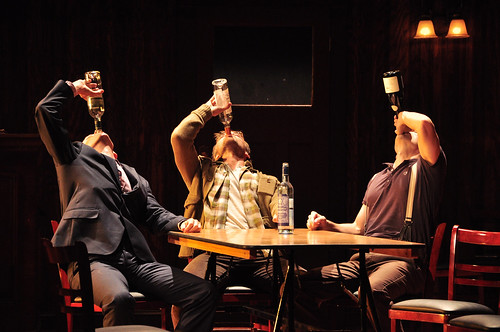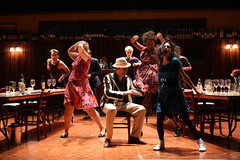After their highly acclaimed production of “Gatz” (based on “The Great Gatsby”) at the Public Theater last year, Elevator Repair Service has returned to the stage with Ernest Hemingway’s “The Select (The Sun Also Rises)” at New York Theatre Workshop. The group’s third adaptations of a classic of American literature (William Faulkner’s “The Sound and The Fury” was the first) tells the story of expatriates living in Europe after World War I. They’re members of Gertrude Stein’s “lost generation” – left numb by the atrocities of war.
“The Select,” named after a bar frequented in the novel, capitalizes on the original work’s witty, fast-paced dialogue. In addition, protagonist Jake Barnes, a newspaperman rendered impotent by a war wound (played by the lackluster Mike Iveson) narrates the action of the play, often punctuating his dialogue with an “I said.” Through Jake’s eyes we see the world of 1920s Paris as he aimlessly wanders from bar to bar, downing large quantities of alcohol in order to stave off the nagging despair and insecurities his injury has left behind.
Surrounding Jake are a group of eccentric ex-patriots and Parisian and Spanish locals, played by the other nine actors, with standout performances from Ben Williams as the visiting American journalist Bill Gorton and Pete Simpson as Brett Ashley’s alcoholic fiancée, Mike Campbell.
The lost generation’s physical and spiritual failings are apparent in Jake’s relationship with Brett (Lucy Taylor), the fiercely independent, sexually liberated object of his affections. Unable to consummate their relationship, the couple is kept apart, each trapped in their own emotional turmoil, masked by alcohol and frivolous distractions.
Yet Jake’s deep-rooted despondency seems more like detached bemusement coming from Mr. Iveson. In his scenes with Brett (who teeters perfectly between acting the careless party girl and deep fits of depression), Jake seems unfeeling to the point of boredom. Mr. Iveson’s nasal narration falls flat. In an even-keeled pragmatic tone, he recites the text as if it were an instruction manual – the lush symbolism is lost, and Hemingway’s prose becomes just words.
Thankfully, the sense of ennui that is missing here is perfectly captured in the play’s staging, specifically the large-scale dance numbers choreographed by Katherine Profeta. In the first act, Jake and Brett dance to a 1960s French pop song at a Parisian café (the production takes no heed of period realism). Limbs lazily flop from side to side in a manic, rollicking dance that stops and starts again without warning. It’s delightful to watch, but the darker underlying message is that in life, these people are doing the same tired dance over and over without much point or effort. “Oh darling, I’m so miserable,” Brett yells to Jake with an air of coolness, without losing her footwork – and then her face contorts to tears.
Just as Hemingway’s writing is sparse but symbolic, so is the production’s minimalistic set design. The actors pantomime drinking from empty liquor bottles, with sound effects to indicate pouring. Decanters and bottles are littered across two long folding tables, around which the actors play musical chairs as they move from bar to bar. The endless merry-go-round of drinking is the perfect metaphor for the ineffectiveness of alcohol to alleviate the characters’ deeper anguish. They pour the liquor (a form of nothingness) into an emotional void it cannot begin to fill.
Though the production struggles with Hemingway’s words, it is ultimately through the use of theatrical stage elements that ERS conveys the true spirit of “The Sun Also Rises.”
“The Select” at New York Theatre Workshop (79 East Fourth Street) until October 9. Tickets $70. Visit www.nytw.org or call 212-460-5475.





